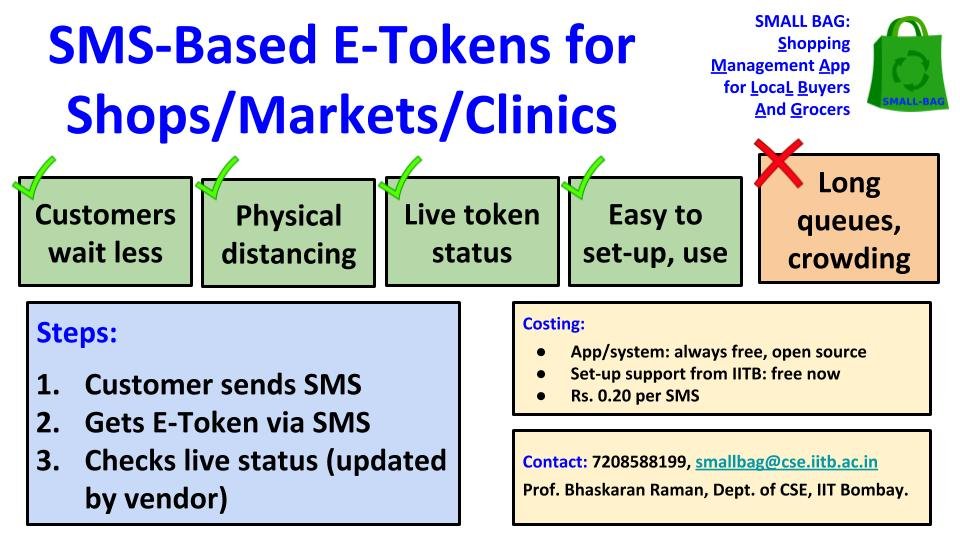Apps and technology in the time of Corona
In this time of world-wide pandemic, how can technology be best used to alleviate the various unique problems we face? As a group, we are interested in discussing, critiquing and developing such citizen-focused technology intervention. The goal is to use technology, driven by ground needs, and with sensitivity to socio-economic side-effects of the use of technology.
Below, we provide links to a few such attempts, at various levels of maturity and deployment-readiness. Please feel free to write to us at indscicov@gmail.com or join our google group, if you wish to discuss more or participate in such efforts.
Connecting with healthcare providers:
A team led by Prof Kameswari Chebrolu of the Dept of CSE/IITB has developed the WWH (World Wide Help) platform, that can connect people requiring help (e.g patients) with those providing help (e.g. health-care providers, doctors). It allows the provision of help remotely to the extent feasible: this is essential during high load and/or lockdown. See https://tinyurl.com/rregaez for details.
Connecting Local Groceries:
While several large stores already have their online ordering apps, many local grocers, vegetable/fruit vendors do not have such apps. In the current situation, it would help in managing demand/supply as well as crowd/queue if local vendors too have online ordering apps. Researchers from Chennai Mathematical Institute and IIT Bombay are in the process of putting together one such app, called SMALL BAG: Shopping Management App for LocaL Buyers And Grocers. A preliminary specification can be found here: https://tinyurl.com/s489as7.

SMALL-BAG has gone live! See https://bit.ly/smallbagpres for a presentation on the E-Token system developed by IIT-Bombay/CMI based team for shopping by local buyers and grocers, goes SMS-based, thus reducing waiting times while ensuring physical distancing.
Contact Tracing:
App-based contact tracing is best if a maximum number of people use the app. For this, buying their trust is of prime importance. In turn, respecting each individual’s privacy is important. In this context, researchers at IIT Bombay are designing (with significant inputs Singapore’s Trace Together app) an open source privacy preserving contact tracing software system, APRiCoT.
In parallel, researchers from IISc, NCBS Bengaluru and IMSc Chennai have been working on an algorithm for improved contact-tracing via mobile phones. Rather than consider only contacts with known infected people, the algorithm maintains a risk factor for each individual which is updated on encountering risky individuals (for example, if you meet someone at high risk because they have met infected people, your risk is increased too). Though algorithms in current use, such as in Aarogya Setu, are not documented for the public, in simulations their method outperforms a “naive oracle” that considers only contacts with infected people but is aware of the infection status of every person met. It also stores most data locally on the phone and requires minimal use of a central server, mitigating privacy concerns. The manuscript is available here and is under processing on medrxiv.org, and the code is available at https://github.com/rsidd120/EpiTracSim/.
Gram Vaani
Gram Vaani is a social technology company incubated out of IIT Delhi. It started in 2009, and using simple technologies and social context to design tools, has been able to impact a number of communities both within India, as well as around the world. Using IVR (Interactive Voice Response) and community radio broadcasting systems, it has set up participatory media networks in 25+ districts in Bihar, Jharkhand, UP, MP, Delhi NCR, and Tamil Nadu, enabling the communities to manage and share voice-based content over mobile phones and the web, with over a million users.
In response to the COVID-19 crisis, Gram Vaani has additionally started missed-call based IVR Systems in four states through which users can listen to pre-recorded FAQs and other content that they are producing on a regular basis, so that there is clear guidance to the community on the best response to the crisis; inform them if they would like to consult a health worker thus maintaining the quarantine even while seeking assistance; and report any issue that they might be facing such as problems with food, cash, or medical emergencies, so that they get the urgent economic and medical support that they need. A network of their partners and volunteers then endeavour to deliver these services either on their own, or wherever possible, in partnership with the local government. The existence of their communication platforms and their civil society response networks, built and nurtured over the years, allows them to quickly reach vulnerable populations that are not connected to the Internet, and to learn about their issues by interacting with them on a regular basis, so that both immediate and longer-term solutions can be found to address them.
For more information contact Aaditeshwar Seth (aseth@gramvaani.org), Co-founder & Director of Gram Vaani, and a faculty in the Department of Computer Science at IIT Delhi.